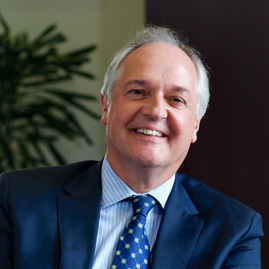Purpose-Driven Business Can Help Rebuild Trust
Trust is a vital element of any well-functioning society. Today, trust in government and other institutions, including business, is at an all-time low. Much of the current public disillusionment is closely linked to the fall-out of the global economic crisis, vacuum in political leadership and the effects of pervasive corruption. Our current economic growth model has led to tremendous progress, lifting hundreds of millions of people out of poverty in recent decades. Yet, it has also resulted in growing inequality, increasing fragmentation in society and runaway climate change. Elites, both political and private, are increasingly motivated and driven by self-interest, diluting their sense of purpose. We see manifestations of this ‘crisis of trust’ on every continent.
We cannot continue with this ‘business as usual’ approach; it is simply not an option for the future. We need to transform the way we consume so we can live within our planetary boundaries, improve governance to ensure transparency, and accelerate the transition to a just and decarbonized economy.
The good news is that we have an agreed vision of the world we want. The UN Sustainable Development Goals (SDGs) – all 17 of them – and the related Paris Climate Change agreement (SDG 13), provide a shared roadmap to build a world that is inclusive, fair, sustainable, stable and prosperous. These agreements were signed by all the nations of the world. They provide a moral framework that leaves no-one behind – so crucial at a time when global governance is not experiencing its finest moments.
Yet, it is increasingly clear that implementation cannot be left to governments alone. This is not because they cannot be trusted, but because they lack the necessary means to bring about the level of change that is needed.
The brilliance of the SDGs is how closely they are interlinked and SDG 17 – Partnership for the Goals – underscores the value of partnership and collaboration to deliver the systemic shifts we require if we want to unlock this opportunity. We can only succeed if we work together.
This is where the role of the private sector is crucial. According to the 2017 Edelman Trust Barometer, three-quarters of the population believe that business can take action to both improve profits and raise wider economic and social conditions. The SDGs also present a minimum $12 trillion economic opportunity for business to help create an economy that is fairer, more stable, broadly based and more sustainable.*
To take purpose-driven, socially accountable business models from the margins to the mainstream, the current operating model needs to change. We need incentive programs to reward business for long-term value creation; legal obligations for company directors to account for the environmental and social impact of the business, and full transparency on ownership and taxation.
All of that will only be possible if government works with business to create the right frameworks for system-wide change. Business needs good government to help set the frameworks of tax and regulation, to develop the infrastructure and to invest in science and technology to achieve this breakthrough.
In turn, by demonstrating its own commitment to this new form of ‘sustainable capitalism’, business can help de-risk the political process and give political leaders the confidence and freedom to act in the best long-term interests of society, and endorse change that might otherwise seem risky.
The Open Government Partnership (OGP), for example, presents another concrete entry point for the private sector to ensure implementation of the SDGs. OGP is already modelling unique forms of collaboration between government and civil society. It has tremendous potential to engage the private sector which would benefit from more open governments through accessing data, better business efficiency, leveling of the playing field and a fairer business environment.
Another example of uncommon collaboration between businesses and government has been in tackling tropical deforestation through the Tropical Forest Alliance, focusing on cleaning up commodity supply chains that have historically caused negative environmental and social impacts. The ‘produceand- protect’ approaches that have been jointly created will preserve natural resources by building a sustainable local economy around them.
These progressive partnerships between business, governments and civil society will serve several purposes from shaping markets to drawing on the best examples of collaboration we already have to scale sector transformation, thereby helping to restore trust and drive sector transformation.
There is tremendous latent leadership potential in the world today – in government, business and civil society. No CEO or Minister wants to see more children go to bed hungry or more pollution to cloud our skies.
With the SDG framework, we have a roadmap for shared purpose, and above all a partnership for the common good. It will take strong leadership and moral courage. If we can, then what better way to restore trust than with purpose?
As the Dalai Lama reminds us; if you seek enlightenment for yourself simply to enhance yourself and your position you miss the purpose. If you seek enlightenment for yourself to enable you to serve others, you are with purpose.
 Paul Polman
Paul Polman
Chief Executive Officer, Unilever
@PaulPolman
* Better Business, Better World report of the Business and Sustainable Development Commission
Get social and spread the word:
 .@PaulPolman shares how progressive partnerships btwn govt, business & civil society can #RenewTrust & drive change http://bit.ly/2x2wt0A
.@PaulPolman shares how progressive partnerships btwn govt, business & civil society can #RenewTrust & drive change http://bit.ly/2x2wt0A
 3/4 of ppl believe business can improve profits & raise econ & social conditions. @PaulPolman weighs in http://bit.ly/2x2wt0A #RenewTrust
3/4 of ppl believe business can improve profits & raise econ & social conditions. @PaulPolman weighs in http://bit.ly/2x2wt0A #RenewTrust
 No CEO or Minister wants to see more children go to bed hungry or more pollution to crowd our skies. http://bit.ly/2x2wt0A #RenewTrust
No CEO or Minister wants to see more children go to bed hungry or more pollution to crowd our skies. http://bit.ly/2x2wt0A #RenewTrust
